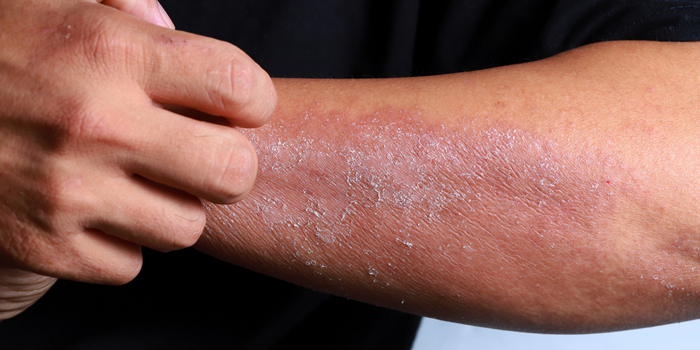Oncology Patient Resources
Cancer.Net is the patient information website of the American Society of Clinical Oncology (ASCO). All patient education content is reviewed and...

Are you familiar with sarcoidosis? It's something that many people aren't aware of, yet it affects thousands of individuals throughout the world.
Sarcoidosis is an autoimmune related disease that leads to inflammation, like eczema and atopic dermatitis, usually in your lungs, skin, or lymph nodes and can affect any organ in your body.
In this blog post, we will cover what sarcoidosis is, the symptoms associated with it, treatments available, as well as general healthcare knowledge regarding living with this condition. Please consult with your physician for the best treatment course for you.
Sarcoidosis is an autoimmune, inflammatory disease that can occur anywhere in the body, from your lungs and lymph nodes to more unexpected places like eyes and heart. Granulomas form on affected organs as a result of this condition, leading to sometimes serious complications if left untreated.
The cause of sarcoidosis is unknown. Experts suspect that any combination of infectious agents, chemicals, dust and a potential abnormal reaction to the body's own proteins could be responsible for this disease in certain people who have an innate predisposition.
Learn more about the Dermatology Specialty Pharmacy.
Sarcoidosis can cause a variety of effects depending on which organs it targets. For some, sarcoidosis disease will gradually develop and see symptoms for many years, while others experience sudden symptoms and disappear just as quickly.
Many people with sarcoidosis have no symptoms, so the disease may be discovered only when a chest X-ray is done for another reason.
| General Symptoms | Eye Symptoms | Heart Symptoms | Lung Symptoms | Skin Symptoms |
| Fatigue | Blurred vision | Chest pain | Persistent dry cough | A rash of red or reddish-purple bumps, usually located on the shins or ankles, which may be warm and tender to the touch |
| Swollen lymph nodes | Eye pain | Shortness of breath | Shortness of breath | Disfiguring sores (lesions) on the nose, cheeks and ears |
| Weight loss | Burning, itching or dry eyes | Fainting | Wheezing | Areas of skin that are darker or lighter in color |
| Pain and swelling in joints, such as the ankles | Severe redness Sensitivity to light |
Fatigue | Chest pain | Growths under the skin (nodules), particularly around scars or tattoos |
| Irregular heartbeats | ||||
| Rapid or fluttering heart beat | ||||
| Swelling caused by excess fluid |
Symptoms for sarcoidosis vary, depending on the part of the body that is involved.
Pulmonary sarcoidosis is the most common form of this condition, and it can have some uncomfortable symptoms. Granulomas in the lungs often result in shortness of breath, a cough, chest pain and fever.
Cardiac Sarcoidosis is a rare condition with potentially life-threatening consequences. Symptoms include fatigue, coughing, breathlessness and even dizziness in some cases, leading to heart failure or loss of consciousness if left untreated.
Skin sarcoidosis, also known as cutaneous sarcoidosis, occurs in nearly 25 to 30 percent of people and is more common among Black people. Symptoms can range from mild, with granulomas or lesions on the skin, to more severe, affecting a person’s quality of life and day-to-day activities.
Ocular sarcoidosis affects the eyes, and symptoms depend on which part of the eye is affected. The most common part of the eye that's affected is the uveitis. Those symptoms include redness, inflammation, and pain in the eyes and nearby tissues.
Sarcoidosis affects the nervous system in approximately 10 percent of people with sarcoidosis. Almost any part of the nervous system can be involved, including the brain and meninges, the spinal cord, facial and optic nerves, hypothalamus and the pituitary gland, peripheral nerves, and muscles.
Most people with hepatic sarcoidosis do not experience symptoms or require treatment because it does not usually affect the organ’s function.
Renal sarcoidosis affects the kidneys, and in some cases can result in kidney failure.
In rare cases, sarcoidosis can also affect the bones, stomach, and the reproductive organs.
Although there is no cure for sarcoidosis, in many cases, it will go away on its own and may not require treatment. The severity and extent of your condition will determine if you need treatment and what type is needed.
Organ transplant may be considered if sarcoidosis has severely damaged your lungs, heart or liver.
Some medications include:
In cases of immune system over activity, the body attacks and damages its own tissues (autoimmune diseases). Immune deficiency diseases decrease the body's ability to fight invaders, causing vulnerability to infections.
Senderra specialty pharmacy offers specialized treatments for more than 15 specialties including autoimmune disorders, like Lupus Nephritis, Guillain Barre Syndrome, rheumatoid arthritis, MS, CRSwNP and chronic asthma, gastroenterology, immune system disorders, dermatologic diseases, and more.
We put you first.
You deserve to be treated as a person, not a number.
With Senderra, you'll talk with real people who are dedicated to enabling you to get the medications and supporting information you need for your condition.
 Senderra is a national specialty pharmacy, serving patients with challenging and ongoing medical conditions, like autoimmune disorders, through provision of specialty medications, clinical expertise and support services.
Senderra is a national specialty pharmacy, serving patients with challenging and ongoing medical conditions, like autoimmune disorders, through provision of specialty medications, clinical expertise and support services.
We dedicate ourselves to designing and executing a model to serve the needs of our patients and partners (Prescribers, Pharma and Payers) in order to make a difference and effect positive outcomes.
Disclaimer:
No content on this site, regardless of date, should ever be used as a substitute for direct medical advice from your doctor or other qualified clinician.
References:

Cancer.Net is the patient information website of the American Society of Clinical Oncology (ASCO). All patient education content is reviewed and...

An estimated 2.4 million people are living with Hepatitis C in the United States. About 4 in 10 people with Hepatitis C do not know they are...

Psoriatic Arthritis (PsA) is a chronic autoimmune disease that affects millions of people worldwide. It's a condition that not only causes joint pain...